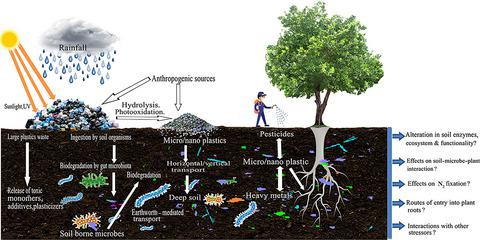当前位置:
X-MOL 学术
›
Glob. Change Biol.
›
论文详情
Our official English website, www.x-mol.net, welcomes your feedback! (Note: you will need to create a separate account there.)
Perspectives and challenges of micro/nanoplastics-induced toxicity with special reference to phytotoxicity.
Global Change Biology ( IF 11.6 ) Pub Date : 2020-04-18 , DOI: 10.1111/gcb.15074 Sukhendu Maity 1 , Kousik Pramanick 1
Global Change Biology ( IF 11.6 ) Pub Date : 2020-04-18 , DOI: 10.1111/gcb.15074 Sukhendu Maity 1 , Kousik Pramanick 1
Affiliation

|
Plastic pollution has become a global concern for ecosystem health and biodiversity conservation. Concentrations of plastics are manifold higher in the terrestrial system than the aquatic one. Micro/nanoplastics (M/NP) have the ability to alter soil enzymatic system, soil properties and also affect soil borne microorganisms and earthworms. Despite, the knowhow regarding modulatory effects of plastics are acquired from the study on aquatic system and reports on their phytotoxic potentials are limited. The presence of cell wall that could restrict M/NP invasion into plant roots might be the putative cause of this limitation. M/NP inhibit plant growth, seed germination and gene expression; and they also induce cytogenotoxicity by aggravating reactive oxygen species generation. Dynamic behavior of cell wall; the pores formed either by cell wall degrading enzymes or by plant-pathogen interactions or by mechanical injury might facilitate the entry of into roots M/NP. This review also provides a possible mechanism of large sized microplastics-induced phytotoxicity especially for those that cannot pass through cell wall pores. As M/NP affect soil microbial community and soil parameters, it is hypothesized that they could have the potential to affect N2 fixation and research should be conducted in this direction. Reports on M/NP-induced toxicity mainly focused only on one polymer type (polystyrene) in spite of the toxicological relevancies of other polymer types like polyethylene, polypropylene etc. So, the assessment of phytotoxic potential of M/NP should be done using other plastic polymers in real environment as they are known to intract with other environmental stressors as well as can alter the the soil-microbe-plant interaction.
中文翻译:

微观/纳米塑料诱导的毒性的观点和挑战,特别是植物毒性。
塑料污染已成为全球关注生态系统健康和生物多样性保护的问题。陆地系统中塑料的浓度比水生系统中的浓度高得多。微米/纳米塑料(M / NP)具有改变土壤酶系统,土壤特性并影响土传微生物和earth的能力。尽管如此,有关塑料调节作用的知识还是从对水生系统的研究中获得的,有关其植物毒性潜力的报道十分有限。可能限制M / NP侵入植物根部的细胞壁的存在可能是造成这种限制的原因。M / NP抑制植物生长,种子发芽和基因表达;它们还通过加剧活性氧的产生来诱导细胞遗传毒性。细胞壁的动态行为;由于细胞壁降解酶,植物病原体相互作用或机械损伤而形成的孔可能会促进M / NP进入根部。这篇综述还提供了大尺寸的微塑料诱导的植物毒性的可能机制,特别是对于那些不能穿过细胞壁孔的植物。由于M / NP影响土壤微生物群落和土壤参数,据推测它们可能会影响N2固定,因此应朝这个方向进行研究。关于M / NP引起的毒性的报告主要集中于一种聚合物类型(聚苯乙烯),尽管聚乙烯,聚丙烯等其他聚合物类型具有毒理学意义。
更新日期:2020-03-09
中文翻译:

微观/纳米塑料诱导的毒性的观点和挑战,特别是植物毒性。
塑料污染已成为全球关注生态系统健康和生物多样性保护的问题。陆地系统中塑料的浓度比水生系统中的浓度高得多。微米/纳米塑料(M / NP)具有改变土壤酶系统,土壤特性并影响土传微生物和earth的能力。尽管如此,有关塑料调节作用的知识还是从对水生系统的研究中获得的,有关其植物毒性潜力的报道十分有限。可能限制M / NP侵入植物根部的细胞壁的存在可能是造成这种限制的原因。M / NP抑制植物生长,种子发芽和基因表达;它们还通过加剧活性氧的产生来诱导细胞遗传毒性。细胞壁的动态行为;由于细胞壁降解酶,植物病原体相互作用或机械损伤而形成的孔可能会促进M / NP进入根部。这篇综述还提供了大尺寸的微塑料诱导的植物毒性的可能机制,特别是对于那些不能穿过细胞壁孔的植物。由于M / NP影响土壤微生物群落和土壤参数,据推测它们可能会影响N2固定,因此应朝这个方向进行研究。关于M / NP引起的毒性的报告主要集中于一种聚合物类型(聚苯乙烯),尽管聚乙烯,聚丙烯等其他聚合物类型具有毒理学意义。



























 京公网安备 11010802027423号
京公网安备 11010802027423号